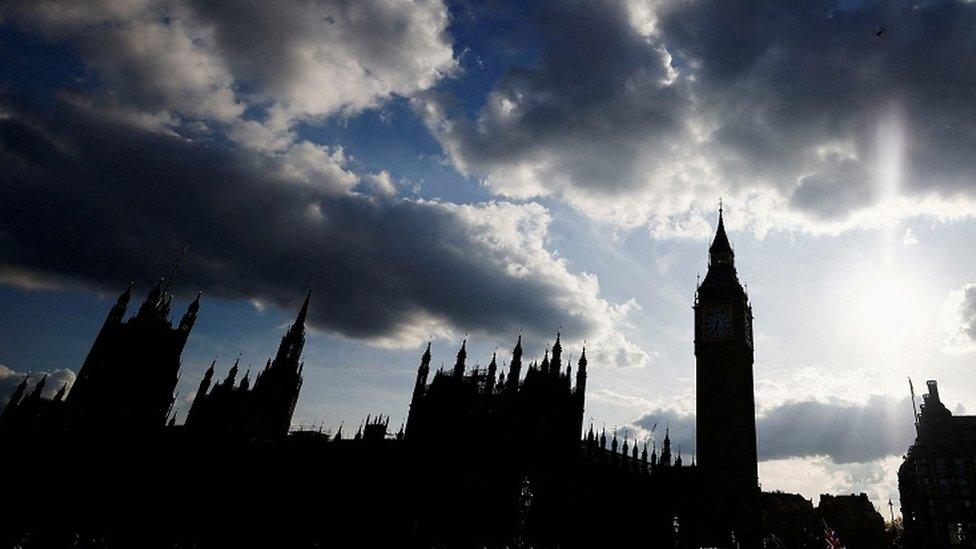What's happening in Parliament this week?
- Published

In the wake of the local elections the political pot is simmering nicely in Westminster, where the key event looks to be the Lords debate on the details of the Retained EU Law Bill, where peers are poised to make changes that will infuriate Brexiteer Tory MPs. (See Monday, below).
The announcement of government changes to the bill has already provoked a spectacular bust-up between the Speaker, Sir Lindsay Hoyle and the Business Secretary Kemi Badenoch; already annoyed by the announcement of the changes in the press, Sir Lindsay was infuriated when she seemed to dismiss his concerns a matter of sequencing.
The trouble is that, beyond issuing rebukes, there's not much the chair can do, if big announcements are not made in the Commons chamber.
The Speaker can't ban ministers, dock their pay or otherwise discipline offenders without a vote of the House, which the government would surely block.
Watch Speaker angrily berate minister for media leaks
I keep banging on about the building congestion in the Lords.
The latest manifestation is that peers' detailed trawl through the Levelling Up Bill will extend to a 14th day on Monday 22, which suggests seven long days of report stage consideration will have to be crowbarred into Their Lordships' already crowded agenda.
That will increase the clamour from Conservative MPs and local councillors to get some of the devolution powers they want into law.
And it could mean a huge logjam of bills just before the likely end of the parliamentary session in October/November.
That in turn gives peers a lot of leverage against legislation they don't like.
Monday 15 May
Commons: (14:30) Defence questions, with any urgent questions or government statements following at 15:30.
Main debate: Second Reading of the Victims and Prisoners Bill which aims to improve support for victims of crime and amplify their voices in the criminal justice process.
It brings in a new Public Advocate to represent victims and families caught up in disasters like Hillsborough.
But campaigners are not content with the proposals, so expect some cross part attempts to beef up the new system.
There's also concern around provisions for the justice secretary to intervene in decisions by the Parole Board, perhaps taking over the decision in high-profile cases.
This has already attracted string criticism - and there will be pressure on new Justice Secretary Alex Chalk to drop the plan drawn up by his predecessor Dominic Raab.

Kemi Badenoch's EU retained law bill is in the Lords
Westminster Hall: (16:30): MPs debate two e-petitions around food labelling, e-petition 585304 calls for the government to bring in 'Owen's Law' - named after 18-year-old Owen Carey who died of an allergic reaction.
Campaigners want UK restaurants to put all information about allergens in their food on the face of the main menu and require waiters to discuss allergies with customers.
The second petition, e-petition 589716 calls for the appointment of an Allergy Tsar as a champion for people living with allergies.
Committees: Public Accounts (15:30pm) returns to one of its key issues, with evidence from Treasury Permanent Secretary James Bowler and other top officials on tackling fraud and corruption.
Lords: (14:30) Retained EU Law (Revocation and Reform) Bill - Report (day one of two). This is the point where peers make serious attempts to rewrite a bill - and this one will see some very heavy-duty politics.
This is a key Brexit measure to reprocess or simply dump the vast body of law accumulated during the UK's EU membership.
At the time of Brexit it was translated wholesale into British law because there wasn't time to sift through it in detail, and this bill originally said those laws - now estimated at 4,800, could be rewritten by ministers, or would be repealed at the end of the year - the so-called sunset clause.
Critics argued that this deadline was too tight and that necessary regulations could simply disappear. Business Secretary Kemi Badenoch has now decided to ditch the sunset clause, and instead there is a list of 600 laws slated for repeal.
This addresses one concern around the bill, but many peers also objected to the sweeping powers the bill will give to ministers to rewrite retained EU law.
Their response is to propose a new amendment requiring that those 600 laws are sifted by a committee of MPs and Peers, so Parliament can express a view on any changes proposed by ministers.
The amendment is proposed by pro-Brexit Conservative Lord Hamilton of Epsom, former Tory Chief Whip Lord McLoughlin and Crossbenchers Lord Hope and Lord Anderson. Opposition parties are keeping their distance, but will doubtless support the amendment.
The government has tried to compromise but now seems to be is caught between its Brexiteer MPs and a probable majority of Peers. This could get messy.
Tuesday 16 May
Commons: (11:30) Justice questions
Ten minute rule bill: Conservative Flick Drummond wants to bring in a register for children who are not at school.
Main debate: SNP Opposition Day motions to be announced
Westminster Hall: Lib Dem Daisy Cooper leads a debate on the adequacy of NHS investigations into abuse and sexual assaults (11:00); Conservative Gordon Henderson has a debate on farmers, supermarkets and food supply chains.
Committees: Education (10:00) focuses on persistent absence and support for disadvantaged pupils with evidence from Square Peg, a social enterprise working with children who struggle to attend school and their families, the Special Education Consortium, the Traveller Movement and the Child Poverty Action Group.
Health (10:00) hold the second evidence session on assisted dying, hearing from jurisdictions that have legalised it in some form. The Committee has just published 250 written submissions to their inquiry, some of them harrowing.
Lords: (14:30) Online Safety Bill committee (day seven of 10)
Wednesday 17 May
Commons: (11:30) Scotland questions, followed, at Noon, by Prime Minister's Question Time.
Ten minute rule bill: Labour's Mick Whitley wants to regulate the use of AI in the workplace. This is a subject he has raised repeatedly, arguing AI can be used to violate workers' rights such as privacy, autonomy and fair pay.
Main debate: Second reading of the Digital Markets, Competition and Consumers Bill, which gives new powers to increase competition in digital markets currently dominated by a small number of firms, to making it easier for consumers to opt out of subscription traps that cost them £1.6bn a year, and to tackle fake reviews so customers aren't cheated by bogus ratings.
Westminster Hall: Former cabinet minister George Eustice leads a debate on public bodies and VAT (09:30) and Labour's Marsha de Cordova has a debate on a national eye health Strategy (14:30).
Committees: Home Affairs (10:00) looks at the policing of the Coronation and arrest of republican protestors, plus the Met's approach to policing public protests and the practical implementation of the Public Order Bill. Witnesses include Graham Smith of the campaign group Republic, who was, controversially, arrested as he attempted to protest.
Science Minister George Freeman boldly goes before Science and Technology (09:30) to discuss the future of the UK space launch sector, following the failed satellite launch from Spaceport Cornwall and the collapse of Virgin Orbit.
Lords: (15:00): Retained EU Law (Revocation and Reform) Bill - Report (day 2 of 2)
Thursday 18 May
Commons: (09:30) The first question time for the new-look Business and Trade Department, starring Secretary of State Kemi Badenoch. That's followed by the weekly update on the forthcoming Commons agenda, from the Leader of the House.
Main debate: Backbench debates - first a general debate on public access to nature, then a motion on access to psilocybin treatments - this is the active drug in magic mushrooms, which many, including at least one MP, believe is the only effective treatment for some mental conditions.
Westminster Hall: Backbench debates. Plastic pollution in the oceans (13:30) and National Numeracy Day (15:00)
Lords: (11:00) Peers begin their fast track processing of the Northern Ireland (Interim Arrangements) Bill - the latest in a series of measures dealing with the lack of devolved government.
Then they continue their seemingly endless voyage through the details of the Levelling-Up and Regeneration Bill, with day 13 of committee.
Friday 19 May
Commons: Not sitting.
Lords: (10:00) Peers yomp through a series of private members bills - laws proposed by individual peers, some of their own, which have little chance of becoming law, and some from the Commons, which, with government support behind them, are heading for a place in the statute book.
There are brief third readings for Lord Crisp's Healthy Homes Bill, Lord Wigley's Government of Wales (Devolved Powers) Bill, and Baroness Birtin's Protection from Redundancy (Pregnancy and Family Leave) Bill (this one has been through the Commons and will become law if approved today).
Similarly, the Carer's Leave Bill (Lord Fox), the Electricity and the Gas Transmission (Compensation) Bill (Lord McLoughlin), will have their final stage of consideration.
Then come more substantive second reading debates on more private members bills sent over from the Commons - the Employment Relations (Flexible Working) Bill (Baroness Taylor of Bolton), the Equipment Theft (Prevention) Bill (Lord Blencathra), and the Child Support (Enforcement) Bill (Baroness Redfern). These are all the products of a highly productive round of private members bills in the Commons, with the government speeding through a long list of favoured measures.
Finally there's a Second Reading debate on Lord Story's Water Safety (Curriculum) Bill.
